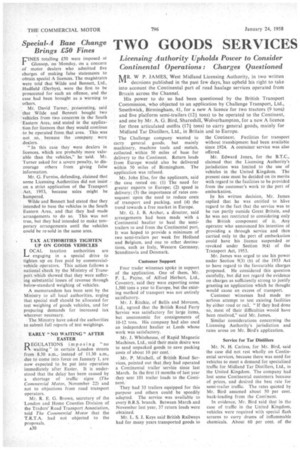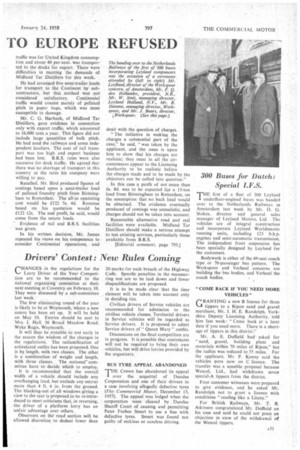TWO GOODS SERVICES TO EUROPE REFUSED
Page 32

Page 33

If you've noticed an error in this article please click here to report it so we can fix it.
Licensing Authority Upholds Power to Consider Continental Operations : Charges Questioned
R. W P. JAMES, West Midland Licensing Authority, in two written decisions published in the past few days, has upheld his right to take into account the Continental part of road haulage services operated from Britain across the Channel.
His power to do so had been questioned by the British Transport Commission, who objected to an application by Challenge Transport, Ltd., Smethwick, Birmingham, 41, for a new A licence for two tractors (9 tons) and five platform semi-trailers (12-1tons) to be operated to the Continent, and one by Mr. A. G. Bird, Shareshill, Wolverhampton, for a new A licence for three articulated outfits (174 tons) to carry general goods, mainly for Midland Tar Distillers, Ltd., in Britain and to Europe.
The Challenge company wanted to carry general goods, but mainly machinery, machine tools and metals, collected, within 50 miles of base for delivery to the Continent. Return loads from Europe would also be delivered within 50 miles of Birmingham. The application was refused.
Mr. John Else, for the applicants, said the case rested on: (I) The need for greater exports to Europe; (2) speed in delivery; (3) the importance of rates consequent upon the need to reduce costs of transport and packing, and (4) the trend towards a free market in Europe.
Mr. G. J. B. Archer, a director, said arrangements had been made with a Continental haulier to haul the semitrailers to and from the Continental port. It was hoped to provide a minimum of two semi-trailers per week for Holland and Belgium. and one to other destinations, such as Italy, Western Germany. Scandinavia and Denmark.
Customer Support
Four trader witnesses spoke in support of the application. One of them, Mr. F. L. Payne, of Alfred Herbert, Ltd., Coventry, said they were exporting some 1.500 tons a year to Europe, but the existing method of transport was not entirely satisfactory.
Mr. J. Ritchie, of Bellis and Morcom, Ltd., agreed that the British Road Ferry Service was satisfactory for large items, but uneconomic for consignments of 10-12 tons. His company had also used an independent haulier at Leeds whose work was satisfactory.
Mr. J. Whitehouse, of Rapid Magnetic Machines, Ltd., said their main desire was to send unpacked goods to save packing costs of about 10 per cent.
Mr. P. Mitchell, of British Road Services, pointed out that they had operated a Continental trailer service since last March. In the first 11 months of last year they sent 101 trailer loads to the Continent.
They had 33 trailers equipped for this purpose and others could be speedily adapted. The service was available to every B.R.S. branch. Between March and November last year, 37 return loads were obtained.
Mr. L. S. J. Keys said British Railways had for many years transported goods to the Continent. Facilities for transport without transhipment had been available since 1924. A container service was also offered.
Mr. Edward Jones, for the B.T.C., claimed that the Licensing Authority's jurisdiction was limited to the use of vehicles in the United Kingdom. The present case must be decided on its merits with regard to the facilities to be provided from the customer's work to the port of embarkation.
In his written decision, Mr. James replied that he was entitled to hive regard to the fact that the service was to be run partly outside Great Britain, and he was not restricted to considering only the British component of it. Any operator who announced his intention of providing a through service and then carried only to the port of embarkation could have his licence suspended or revoked under Section 9(4) of the Transport Act, 1953.
Mr. James was urged to use his power under Section 9(3) (b) of the 1953 Act to have regard to the favourable charges proposed. He considered this question carefully, but did not regard the evidence on charges as sufficiently strong to justify granting an application which he thought would cause an excess of transport.
Customer witnesses had made no serious attempt to test existing facilities by either road or rail. "If they had done so, most of their difficulties would have been resolved," said Mr. James.
Similar considerations concerning the Licensing Authority's jurisdiction and rates arose on Mr. Bird's application.
Service for Tar Distillers
Mr. N. H. Carless, for Mr. Bird, said the case did not rest wholly on Continental services, because there was need for vehicles to meet a demand for specialized traffic for Midland Tar Distillers, Ltd., in the United Kingdom. The company had lost some Continental customers because of prices, and desired the best rate for semi-trailer traffic. The rates quoted by Mr. Bird assumed about 50 per cent. back-loading from the Continent.
In evidence, Mr. Bird said that in the case of traffic in the United Kingdom, vehicles were required with special flash screens to carry drums of inflammable chemicals. About 60 per cent. of the
traffic was for United Kingdom consumption and about 40 per cent, was transported to the,docks for export. There were difficulties in meeting the demands of Midland Tar Distillers for this work.
He had arranged five semi-trailer loads for transport to the Continent by subcontractors, but this method was not considered satisfactory. Continental traffic would consist mainly of pelleted pitch in paper bags, which was most susceptible to damage.
Mr. C. G. Harbach, of Midland Tar Distillers, gave evidence in connection only with export traffic, which amounted to 16.000 tons a year. This figure did not include large quantities of bulk pitch. He had used the railways and some independent hauliers. The cost of rail transport was too high and export business had been lost. B.R.S. rates were also excessive for dock traffic. He agreed that there was no shortage of transport in this country at the rates his company were willing to pay.
Recalled, Mr, Bird produced figures of castings based upon a semi-trailer load of pelleted foundry pitch from Birmingham to Rotterdam. The all-in operating cost would be £122 5s. 4d. Revenue based on his quotation would be £122 12s. The real profit, he said, would come from the return loads.
Evidence of rail and B.R.S. facilities was given.
In his written decision, Mr. James repeated his views on his competence to consider Continental operations, and
dealt with the question of charges.
" The initiative in making the charges a substantial part of the case," he said, "was taken by the applicant, and the onus is upon him to show that his charges are realistic; they must in all the circumstances appear to the Licensing Authority to be realistic before the charges made and to be made by the objectors can be called into question."
In this case a profit of not more than 6s. 8d. was to be expected for a 15-ton load from Birmingham to Rotterdam, on the assumption that no back load would be obtained. The evidence eventually produced of castings was unrealistic, and charges should not be taken into account.
Reasonable alternative road and rail facilities were available. Midland Tar Distillers should make a serious attempt to test existing services, particularly those available from B.R.S.
[Editorial comment, page 793.]




































































































